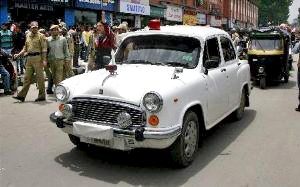
New Delhi, August 3: The Supreme Court today warned the Director Generals of Police and Commissioners of Police in all the states and union territories of contempt action if they fail to take action on use of tinted glasses in vehicles.
A bench of justices B S Chauhan and Swatanter Kumar asked the police machinery in the country to not only challan the offending vehicles but also to take forthwith measures to remove materials pasted on safety glasses by vehicle users.
"We are not emphasising on security threat to nation but it is a clear violation of law. No material can be pasted on safety glasses, this law needs to be enforced.
"DGPs/CPs to ensure complete compliance in true letter and substance. At this stage we will not initiate any action on the DGPs and other officials but issue a clear warning that in case of non-compliance the court shall be compelled to initiate appropriate action under the contempt of courts act without any notice," Justice Kumar said.
On July 22, the Supreme court had expressed its dissatisfaction over tardy implementation of its directions banning the use of tint on car windows, beyond a permissible limit, in Delhi.
The bench had said that the roads of the national Capital still had numerous cars with heavily tinted windows and windscreens and that the users or owners of such vehicles, often involved in accidents, go scot-free.
The court had also noted that most of these vehicles were being used by VIPs enjoying Z-category security.
The bench had observed that the VIPs, who were permitted to use tinted film on their vehicles but only as per due procedure, were exploiting the relaxation granted to them.
The apex court's observations came while hearing a batch of petitions filed by sun film manufacturers association and others seeking clarification as well as modification of the apex court?s order banning the use of tinted glass on vehicle windowpanes.
Concerned over rising instances of criminals using black films on windscreens and side glasses of four wheelers, the apex court had directed the states and the Union territories to strictly enforce the ban on use of tint beyond the limit permitted.
A three-judge bench headed by Chief Justice S H Kapadia had on April 27 said that manufacturers may produce vehicles with tinted glasses which provide for 70 per cent Visual Light Transmission (VLT) for safety glasses on front and rear windscreen and 40 per cent VLT for side glasses.
The directions had come into effect and were enforceable from May 4.
The apex court, however, at that time had given liberty to the police officers concerned to grant exemption to VVIPs like those enjoying "Z" and "Z plus" category security.
The court's verdict had come on a PIL filed by one Avisekh Goenka seeking total ban on all forms of tinted glasses used in four wheelers.
The court, while granting the exemption to VVIPs and others facing threat perceptions, had said, "The cases of the persons who have been provided with Z and Z+ security category may be considered by a committee consisting of the director general of police/commissioner of police of the concerned state and the home secretary of that state/Centre.
The bench had advised that "certificates should be provided only in relation to official cars of VIPs/VVIPs, depending upon the category of security that such person has been awarded by the competent authority."





Comments
Add new comment